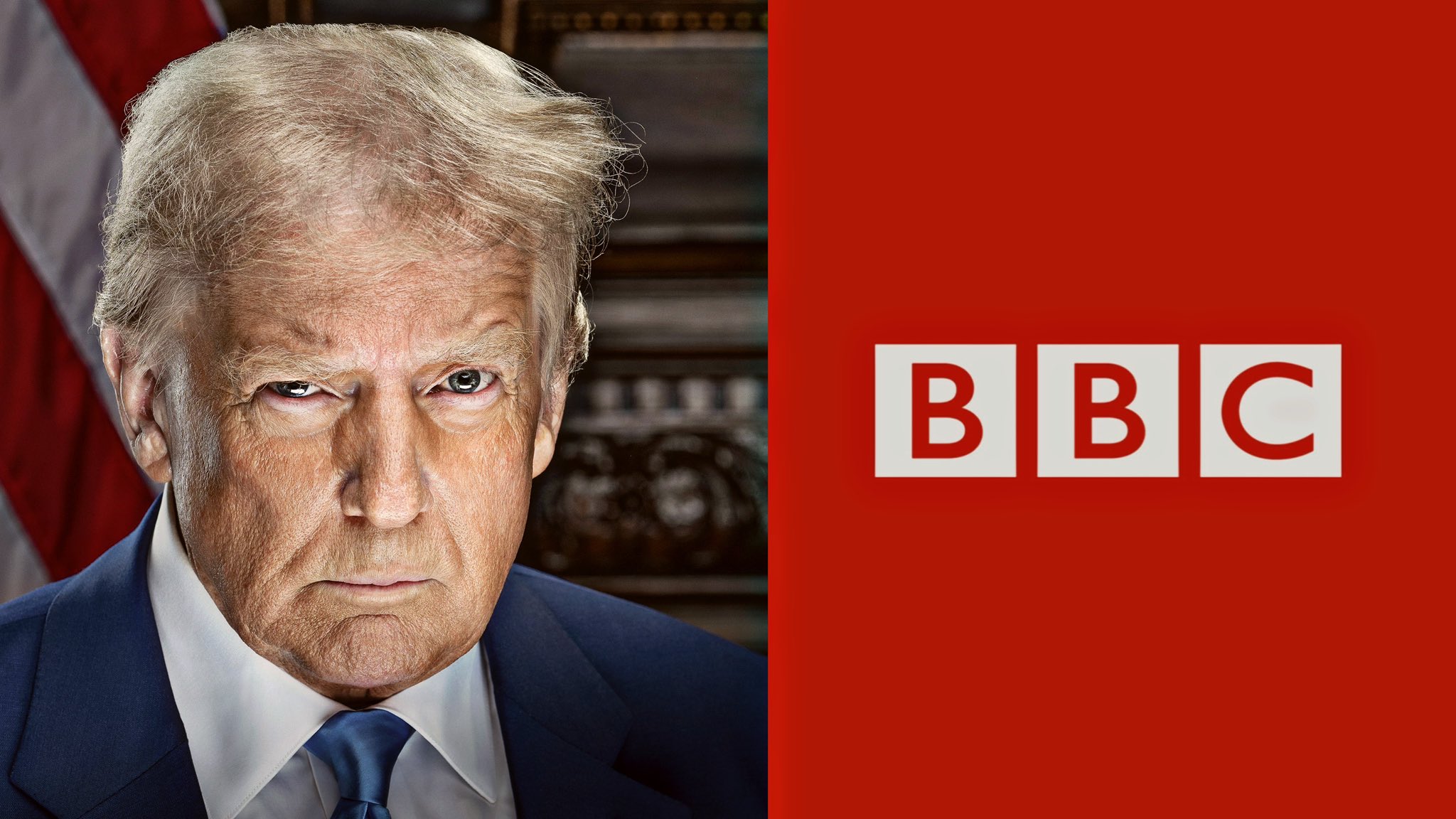London — November 11, 2025 — U.S. President Donald Trump has escalated a transatlantic media firestorm by demanding the BBC retract a documentary and apologize for allegedly defamatory editing of his January 6, 2021, speech—or face a $1 billion lawsuit in U.S. courts. The threat, delivered in a legal letter dated November 9, comes just days after two top BBC executives resigned amid accusations of institutional bias, prompting an unprecedented apology from the broadcaster’s chairman and reigniting debates over its future as a publicly funded entity.
The controversy centers on a 2024 episode of the BBC’s flagship investigative series Panorama, titled “Trump’s America: The Road to January 6.” The program spliced clips from Trump’s Ellipse rally speech, creating the impression he directly urged supporters to “fight like hell” and march immediately to the Capitol—phrasing that, in context, was separated by nearly an hour and included calls for peaceful protest. Critics, including a leaked internal memo from former BBC standards adviser Michael Prescott, labeled the edit “misleading” and part of a pattern of “systemic bias.” 10
BBC Chairman Samir Shah addressed the uproar in a letter to UK lawmakers on Monday, conceding the edit “did give the impression of a direct call for violent action” and describing it as “an error of judgment.” He vowed reforms to bolster editorial oversight at the corporation, which has weathered financial strains, including hundreds of job cuts in recent years, while relying on a mandatory TV licence fee from British households. 11 Shah’s statement followed the dramatic resignations on Sunday of Director General Tim Davie and BBC News CEO Deborah Turness, both of whom cited personal accountability for the lapse.
Davie, who had led the BBC since 2020, told staff his departure was “entirely my decision,” emphasizing that “as director general, I have to take ultimate responsibility” for editorial missteps. 13 Turness, a veteran journalist previously at NBC News, echoed the sentiment, stating the scandal had “reached a stage where it is causing damage to the BBC—an institution that I love.” 16 Their exits, confirmed by BBC insiders, mark a seismic shift at the 100-year-old broadcaster, which has faced serial scrutiny—from a 2004 scandal over Iraq War reporting to earlier 2025 rebukes for a Gaza documentary ruled “materially misleading” by regulators and for airing unvetted anti-Israel remarks at Glastonbury. 18
Trump’s Ultimatum: Retraction or Retribution
Trump’s legal team, led by attorney Alejandro Brito, fired off the cease-and-desist letter to BBC headquarters in London, accusing the network of “false and defamatory” content designed to “interfere in the presidential election” by portraying Trump as inciting the Capitol riot. 0 The demands include:
- An immediate on-air and online retraction of the Panorama episode;
- A public apology acknowledging the “malicious, disparaging” edits;
- “Appropriate compensation” for reputational harm.
Failure to comply by November 14 at 5 p.m. EST (10 p.m. GMT) would trigger a lawsuit seeking no less than $1 billion in damages, potentially filed in Florida where the program was accessible online. 3 Trump, no stranger to media litigation—he recently sued The New York Times for $15 billion over unrelated coverage—hailed the resignations on social media as proof the BBC was “caught doctoring” his “perfect” speech, branding its journalists “corrupt” and “dishonest.” 5 White House Press Secretary Karoline Leavitt amplified the attack, dubbing the BBC “100-per-cent fake news.” 17
The threat has sparked a whirlwind on X (formerly Twitter), with users from Trump supporters to UK conservatives amplifying calls for accountability. One post declared it “the END for the BBC,” garnering hundreds of interactions, while others urged jail time for those involved, tying the scandal to taxpayer-funded licence fees. 24 27 Broader sentiment reflects polarized views: right-leaning accounts celebrate it as a “reckoning,” while defenders decry it as foreign meddling in British media. 2
UK Backlash: From Jubilation to Warnings
The saga has cleaved Britain’s political landscape. Former Conservative Prime Minister Boris Johnson, a longtime BBC critic, vowed to withhold his licence fee until the issue was resolved and demanded Davie’s head. 17 Current Tory leader Kemi Badenoch hailed the resignations as justice for a “catalogue of serious failures,” while ex-BBC journalist Karen Fowler-Watt warned of a “right-wing attack” in a polarized media ecosystem. 13
Liberal Democrat leader Ed Davey fired back at Trump, imploring Prime Minister Keir Starmer to “keep his hands off” the BBC, which he called “the world’s number one news source.” Starmer’s office struck a measured tone, affirming the BBC’s “vital role in an age of disinformation” but insisting it must “correct mistakes quickly” to preserve trust. 15
Public opinion on London’s streets mirrors the divide. Construction worker Jimmy (who declined his surname) told AFP the BBC’s reputation is “tarnished” and its impartiality in doubt, while 78-year-old writer Jennifer Kavanagh sighed that it’s “always attacked from the right and from the left—they can never get it right.”
A Charter in the Crosshairs
Timing couldn’t be more fraught: The UK government is poised to launch a review of the BBC’s royal charter, which governs its operations and funding until 2027. 4 Amid stretched budgets and over 500 viewer complaints since last week’s Daily Telegraph exposé, the scandal has supercharged calls to reform or scrap the licence fee, which generates £3.7 billion annually but faces evasion rates above 10%. 11 Analysts like Fowler-Watt describe the BBC as in “a situation of crisis,” with Trump’s intervention risking perceptions of undue U.S. influence on sovereign media.
Legal experts question the lawsuit’s viability: Defamation claims across borders hinge on proving “actual malice” under U.S. standards, and the BBC’s apology may blunt damages. 3 Yet for Trump, the move aligns with a broader offensive against perceived adversaries, from CNN to CBS.
As the November 14 deadline looms, the BBC must navigate retraction risks that could embolden critics while staving off a financial juggernaut. Shah hinted at a measured response to the “litigious fellow,” but with Trump’s shadow looming over Broadcasting House, the stakes for impartiality—and survival—are higher than ever.

